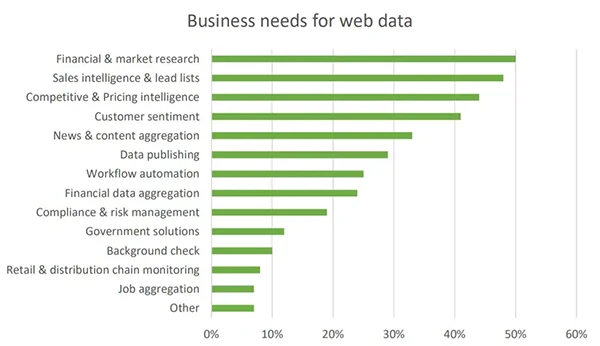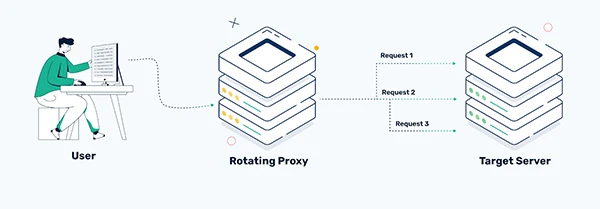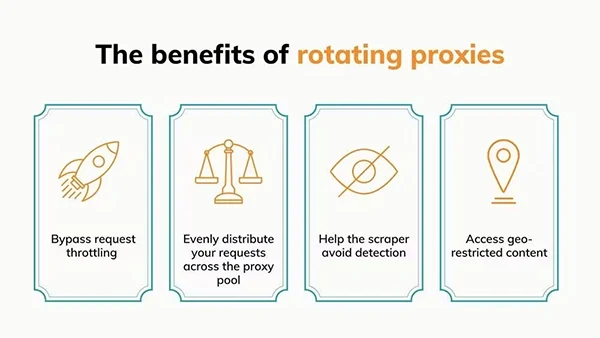The Dynamics of Rotating Proxies: A Comprehensive Overview
Jump To Key Section
A tool that often proves indispensable in web scraping the internet is a proxy. Rotating proxy might sound like a fancy term to someone who has just started digging around the world of tech.
The reality is a bit different, rotating proxies is a handy tool. Specifically for someone willing to protect their online identity or collect data from the web.
To make it simple, it is an intermediary between a user’s device and the internet. How? It requests resources on behalf of the user. Resulting in providing anonymity and bypassing geographical or institutional restrictions.
The actual nuts and bolts of how the Internet works serve purposes like enhanced security to enable access to region-restricted content.
Rotating proxies stand in the proxy technology spectrum offering capabilities pivotal for modern internet usage.
In this post, we’ll cover everything about rotating proxy, intricate workings, diverse applications, and the substantial advantages they confer upon the digital realm.
Understanding Proxies: The Basics
Let’s begin with an illustration:
Suppose, there is a secret agent between you and the vast digital world. That’s essentially what a proxy server does.
Fast Fact:
You can use sticky sessions when running tasks that require keeping the same IP longer. Sticky sessions will let you use the same IP for up to 1, 10, or 30 minutes.
In essence, when you use a proxy, the device doesn’t directly communicate with websites or servers. Instead, it requests sources.
It even serves purposes like amping up privacy and security to improve network performance.
Take notes, there are different types of proxies i.e., public, private, and rotating. It’s important to realize that each of them serves different needs.
The Concept of Rotating Proxies
Traditionally, proxies offer a static solution. But, since modern problems require modern solutions. Here comes rotating proxies in the picture.
You can say rotating proxies are an evolution of those standard proxies.
It automatically changes the IP address at regular intervals or per request. You can even set them to change after a certain time or after a certain number of requests.
You must be wondering, how this rotation is worthwhile. It significantly reduces the risk of IP blacklisting.
For those who are unfamiliar, IP blacklisting is a common problem during web scrapping, where numerous requests are sent to a single website.

Statistics:
After examining the reports, it is estimated that financial and market research get the highest ROI from investing in web data.
Isn’t it great? It is great for businesses and individuals wanting to establish a strong online presence without compromising security.
Technical Workings of Rotating Proxies

Rotating proxies maintain a pool of available IP addresses. You can say this is the technical mechanism behind it
By choosing rotating proxies, you can send thousands of connection requests. This can be triggered when requesting or after a fixed time.
These are convenient back-connect nodes for the whole pool or location-targeted IP pools. Also, it not only maintains requests but also ensures load distribution across diverse servers.
Security and Anonymity Aspects

Rotating proxies provides security benefits on top of the privacy benefits. Here is how:
- Changing IP addresses guarantees anonymity which eventually makes it difficult for sites to track and identify users.
- Mitigates risks like DDoS attacks or IP bans.
- It often supports encryption protocols like HTTPS or SOCKS5.
- Safeguard sensitive data By preventing eavesdropping and man-in-the-middle attacks.
- Users can configure this system to control the frequency and pattern of IP address rotation.
Rotating Proxies in Different Industries
Concerning rotating proxies, there are three main industries where you can equip them. Those are as follows:
- Data Scraping: Rotating systems allow the extracting of large volumes of data without triggering anti-scraping mechanisms.
In between scrapping, it lets you avoid IP-based bans and penalties. This ultimately helps to overcome rate limits, and access geo-restricted content.
- Digital Marketing: Marketers use it to acquire competitor analysis and SEO campaigns. This way, they can stimulate traffic from different geographical locations.
- Cybersecurity: Firms use it for anonymous intelligence gathering and threat analysis. Also, it can be used to penetrate testing to simulate attack scenarios from different IP addresses.
- Business: Its usage in business is often related to the need to collect data on a scale.
Do You Know?:
In 2022, around 25 billion web pages were scraped every day for investment purposes.
- Financial Services: You can utilize rotating proxies for data collection and analysis in stock market research.
Choosing the Right Rotating Proxy Provider
Whether you are a business professional, researcher, or web enthusiast, there are possibilities of mistakenly choosing the wrong rotating proxy provider.
Relax, we are here to help you out!
When it’s time to choose the rotating proxy provider, your decision should be made by keeping a few factors in mind.
At first, the size and diversity of the IP pool determine the effectiveness of the rotation.
Secondly, check for its reliability and speed since it assures seamless operation, especially when doing time-sensitive tasks.
Thirdly, check out the price model because it may vary provided to the provider.
And lastly, research by yourself. Otherwise, you can test services before committing.
These are the factors to consider while choosing the right rotating proxy provider that aligns perfectly with your needs and budget.
Challenges and Limitations
Here are a few challenges and limitations associated with rotating proxies:
- Technical Issues: Slow rotation speed, limited IP pool, or even poor server performance can hamper processes.
- Legal Restrictions: A few countries limit its usage. To cope, it calls for a careful assessment of local laws.
Such systems may face new hurdles. There is nothing new in it.
Future Trends and Developments

You can expect to see a promising future knotted with advancements in technology.
AI-powered rotation and machine learning will take a toll and deliver smarter proxy solutions. Those are capable of mimicking human browsing patterns more accurately and anonymously.
Further, you can witness the evolution of internet protocols, cybersecurity measures, GDPR compliance, and other data protection laws to address concerns like user privacy and data handling.
Conclusion
Having access to rotating proxies is an excellent deal. Why? In comparison with static proxies, rotating proxies can save a lot of time and effort.
These are considered to be a perfect blend of anonymity, security, and efficiency.
Having a clear understanding of the basics of proxies, and its technical workings, you’ll never fail to adapt and rotate IP addresses efficiently.
Irrespective of its usage by individuals or businesses and in diverse industries, these are of great importance to deal with the complexities of internet security and data management.








